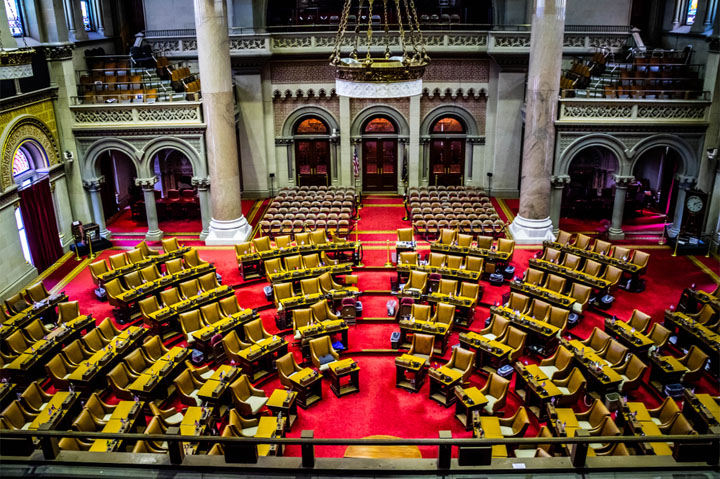May 20, 2024
NY Bill Would Limit Plastic Packaging, Aim To Increase Recyclability
New York lawmakers hope to shift the burden of recycling costs to vendors, while incentivizing the use of recyclable materials in packaging.
A new piece of legislation passed in New York may transfer the cost of recycling plastic packaging to the vendor, rather than the consumer through traditional processes. It’s part of an overall effort in the state to limit the plastic packaging ending up in landfills.

Photo: Cheri Alguire/Shutterstock
The bill, called the “producer responsibility act,” was designed to reduce plastic packaging used and increase recyclability by ultimately charging the producers of goods the cost of disposing of the packaging that would end up in a landfill. The legislation also would include bans on potentially harmful substances used in packaging.
If the bill passes in its current form, companies will need to reduce their plastic packaging by 10% within three years. After 12 years, that number jumps to 50%. Also, 75% of packaging material must be recyclable, including plastic packaging, by 2050.
The major companies this would affect are the likes of Amazon, Unilever and other big consumer brands that mail directly to consumers and use a lot of plastic packaging. The money raised through the program would reportedly go back into the local governments to aid in waste disposal and recycling programs. Ideally, the legislation would ease some of the costs on the government, which has been bearing the financial weight of recycling programs and waste removal.
Opponents of the bill claim that the real cost increases would trickle down to the consumer, and “limit the convenient choices that grocery shoppers have come to expect,” according to Scientific American. Some claim there aren’t “readily available alternatives” for some of the chemicals listed in the bill.
Lawmakers who support the bill, however, argue that consumers are in favor of environmental alternatives, and that they are currently on the hook for the waste-removal programs through their tax dollars.
“You don’t have to wrap everything in plastic,” NY Assemblymember Michaelle Solages told Scientific American. “I think it is a sin to even wrap fruits and vegetables in plastic.”
Solages added that NY lawmakers are currently working on minimizing costs to consumers as a result of the bill, should it pass.
“We’re just throwing all this waste in our garbage,” Solages said. “At the end of the day, it’ll cost us more to clean up all the impacts to the Earth.”
Opponents of the bill currently include unions of steelworkers and Teamsters representing sanitation workers, who claim that the bill could result in new organizations collecting waste.
“This legislation is a direct assault on organized labor,” the Teamsters said in a memo, according to Scientific American. “This legislation allows municipal waste-removal forces, both public employee and currently contracted private companies, to be replaced by a state-supervised private collections force without any regard to workers’ rights.”
However, New York City’s Deputy Mayor for Operations Meera Joshi said there have already been discussions about protections for the city’s waste-removal workers.
New York has been active in its legislative fight for environmentalism. It has already enacted plastic-bag bans, and has passed legislation regarding PFAS chemicals in packaging and apparel.
On a nationwide level, there’s a visible tide change when it comes to packaging use. Anecdotally, companies like Apple that have relied on the unboxing experience and packaging that gives off a luxury-product experience, are already doing things to limit plastic waste.
The latest move from Apple is potentially eliminating the famous Apple logo stickers that come with most consumer products, including iPhones, Mac computers and iPads. Recently, Apple changed the paper backing of the stickers to a wax paper. But, according to ARS Technica, Apple is fully winding down its sticker giveaways, which have been in place since the 1970s. The report says Apple retail stores will still have a limited number of stickers that customers can ask for, but they will not be given out by default.
Whether or not the bill in New York passes in its current state, the nature of plastic packaging is changing in the U.S. as lawmakers hope to meet their constituents’ expectations.
“I think the industry is trying hard to reduce the plastics they use and improve recyclability,” New York Assemblymember Carrie Woerner told Scientific American.
New York Senate Majority Leader Andrea Stewart-Cousins also told Scientific American that lawmakers are continually having conversations with community members to zero in on the changes they want, while keeping any costs in mind.
“We want to make sure that we have input, so at least whatever we do legislatively not only reflects, to the extent possible, the real concerns that people bring to us and we weigh it against the real results that we’re trying to achieve,” she said. “Obviously, we all are getting all kinds of things that should not be in landfills, so we are trying to get to a point where we’ve got a piece of legislation that will pass.”
The current version of the bill will likely change in the coming weeks, but the New York legislative session is set to end on June 6.

Promo for the Planet is your destination for the latest news, biggest trends and best ideas to help build a more sustainable and socially-responsible industry.
